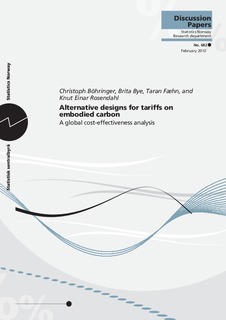| dc.contributor.author | Böhringer, Christoph | |
| dc.contributor.author | Bye, Brita | |
| dc.contributor.author | Fæhn, Taran | |
| dc.contributor.author | Rosendahl, Knut Einar | |
| dc.date.accessioned | 2012-02-26T20:00:07Z | |
| dc.date.available | 2012-02-26T20:00:07Z | |
| dc.date.issued | 2012 | |
| dc.identifier.issn | 1892-753x | |
| dc.identifier.uri | http://hdl.handle.net/11250/180749 | |
| dc.description.abstract | In the absence of effective world-wide cooperation to curb global warming, import tariffs on embodied carbon have been proposed as a potential supplement to unilateral emissions pricing. We systematically consider alternative designs for such tariffs, and analyze their effects on global welfare within a multi-region, multi-sector computable general equilibrium (CGE) model of global trade and energy. Our analysis shows that systems more likely to comply with international law yield very little in terms of carbon leakage and efficiency. Generally, the effectiveness increases substantially with complexity. However, regionalising the tariffs seems not to be worthwhile. Also, the most effective system we identify is not based on fully input–output-corrected carbon contents, but on direct plus electricity emissions, only. This reflects the more general problem of finding systems that are both feasible and well-targeted in a real global economy. | en |
| dc.language.iso | eng | no_NO |
| dc.publisher | Statistics Norway, Research Department | no_NO |
| dc.relation.ispartofseries | Discussion Papers;682 | |
| dc.subject | Global warming | no_NO |
| dc.subject | Carbon taxes | no_NO |
| dc.subject | Emissions | no_NO |
| dc.subject | Computable general equilibrium (CGE) model | no_NO |
| dc.subject | Carbon leakage | no_NO |
| dc.subject | JEL classification: Q43 | no_NO |
| dc.subject | JEL classification: Q54 | no_NO |
| dc.subject | JEL classification: H2 | no_NO |
| dc.subject | JEL classification: D61 | no_NO |
| dc.subject | Klimaavtaler | no_NO |
| dc.subject | Utslipp til luft | no_NO |
| dc.title | Alternative designs for tariffs on embodied carbon. A global cost-effectiveness analysis | no_NO |
| dc.type | Working paper | no_NO |
| dc.subject.nsi | VDP::Social science: 200::Economics: 210 | no_NO |
| dc.source.pagenumber | 37 s. | no_NO |
